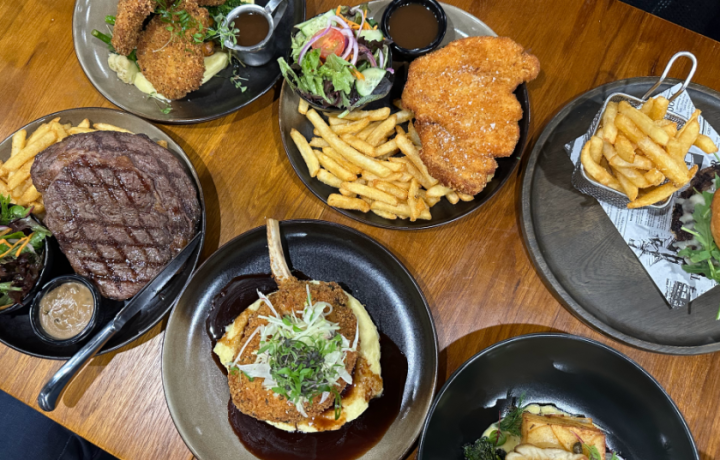Anyupa Emily Butcher on family legacy, Australian rock history, and Big Name, No Blankets

Posted on
What does it take to transform your father’s groundbreaking musical journey into a piece of rock ‘n’ roll theatre?
It’s a question that Anyupa Emily Butcher, co-director of Big Name, No Blankets, faced when she decided to honour the trailblazing legacy of the Warumpi Band – Australia’s first rock band to sing in Aboriginal languages.
And as the daughter of founding member Sammy Tjapanangka Butcher, there’s no one better to tell the story of these musical trailblazers.
Coming to Canberra from Thursday 10 until Saturday 12 July – which also encompasses NAIDOC Week – Big Name, No Blankets tells the electrifying story of Sammy (lead guitar) and his two younger brothers, Gordon (drummer) and Brian (bass). Going from jamming on a flour drum in Papunya in the 1970s to wild nights of pub rock and touring the world, the three musicians sent waves through Australia’s cultural landscape that continue to influence contemporary Indigenous music.
Weaving in culture from Central Australia and Northeast Arnhem Land and two ancestral languages – Luritja and Gumatj (Yolngu Matha) – as the band navigates the divides between bush and city, white and black, fame and family, we sat down with Anyupa to talk about the importance of bringing her family’s musical legacy to life for new audiences this NAIDOC Week.
What was it like growing up as the daughter of a Warumpi Band founding member?
For myself and my brothers and sisters and my cousins, we all grew up really close as a family, and it was really unique being able to see our dads play on stage and across the country. A lot of us have fond memories of going to concerts and falling asleep at gigs and being woken up with our favourite songs playing. Just the music around the household when we’d be spending time together at home, it was a very unique childhood, and I didn’t realise they were famous until we were older, because it was such a normality. Our life completely revolved around music.
What inspired your decision to co-direct this production and how does it feel to be telling your family’s story on stage?
It feels very empowering being able to depict my family and our community in a way that represents us accurately and gives that deeper meaning to what Warumpi Band is. Warumpi is the name place for Papunya, which is about the honey ant dreaming. In the show, you hear our language – Luritja – embedded throughout, which also pays tribute to what Warumpi Band achieved as the first Aboriginal rock and roll band to record a rock and roll hit in language.
It was beautiful working with my dad, Sammy, and my brothers and sisters. Even our children were part of the rehearsal process as well, so it was intergenerational storytelling. For them to be able to see their grandfather’s story and hear the music on stage felt special, because it reminded me of my childhood, of seeing Warumpi Band play on stage and giving that opportunity to the younger generation. And that theme is woven throughout the story as well.
Every scene in the show is a living memory of Dad’s time playing in the band, and he’s the last surviving Aboriginal founding band member. Andrea James has just done such a wonderful job of bringing all my Dad’s memories to life.
How does your father feel about seeing his story told this way?
Theatre is such a new way of storytelling. We don’t do theatre shows in the bush, so it was a process to articulate what the vision looked like. There was one point in rehearsals where my dad turned to me and said, “Oh, are they gonna have those papers on stage?” – meaning the scripts – and I was telling him “Dad, they have to memorise every line, practise and memorise everything”. It wasn’t until we were bringing everything to life in Sydney, where we first premiered the show, that I feel like he really understood the magic of theatre.
I remember the first time we saw the show on the proper stage with the set, the lights and everything, and I looked over to him, and he was just in tears. It was a really moving experience, because he has such fond memories of touring the world with his brothers and representing his family, his people and their songs being rock anthems that brought together not just Aboriginal people from different communities, but also non-Indigenous people.
What were the biggest challenges in translating the Warumpi Band’s story into theatrical form while maintaining cultural authenticity?
That’s where Dad and I really worked well with Andrea. It was a beautiful collaboration. Having ways that are also very inclusive to our families and people of the desert when they watch the show and they hear and see scenes in their own language, it has a deeper meaning to it, and it also allows audiences to listen with translation. They listen and they see the scenes unfold before their eyes as they’re hearing our traditional languages, which I feel like is a really beautiful way to share with audiences.
How does this production fit into the broader conversation about Indigenous stories being told by Indigenous voices?
For me, Warumpi Band really inspired me and what was really beautiful messaging in my upbringing was to be proud of who you are and where you come from. My family do come from the bush, and especially here in the NT, we get a lot of negativity that comes from the way media reflect remote Aboriginal communities. And this was a way to actually empower ourselves, to show desert people for who we truly are. I feel like this was a special way to share a story from a remote part of Central Australia.
The show took six years to develop, and when I first asked Dad what he wanted the show to be, he said one word, and that was ‘Hope.’ That’s what we’ve worked really hard to achieve and I feel like that’s the story that’s needed – a story about hope that’s from the bush and that is inclusive of all of its audiences to be part of that journey with us.
What’s the significance of this event happening during NAIDOC Week and how do you believe it connects to the theme of “The Next Generation: Strength, Vision & Legacy”?
As I mentioned, this story is all about intergenerational storytelling, and that’s part of our legacy as First Nations people – we’ve passed on stories since time immemorial. This is just a modern take on that, you know, between generations.
Warumpi Band was a band for the people, and I feel like this show is giving back to people, inspiring hope within its audiences. But I also feel like it is particularly special for First Nations people. This show has all those themes about what the songs reflected when it comes to our struggles, when it comes to our strength, and when it comes to our legacy. It’s incredible that we will be in Canberra for NAIDOC Week. And I really hope that the show brings hope to mob, but I feel like it will inspire people to write and tell their own stories as well.
What do you hope audiences – both Indigenous and non-Indigenous – take away from this show?
I hope they get a greater insight into my dad’s music, and they understand – when they see the scenes come to life – what inspired them to write those songs. It’s a way to enjoy Warumpi Band’s music but also see Warumpi Band from a different perspective, which is the perspective of my dad and the Butcher family from Papunya.
I hope audiences get to see a little bit of the bush come to Canberra, to hear Luritja, to hear Aboriginal rock and roll and most of all, just to enjoy the story.
THE ESSENTIALS
What: Big Name, No Blankets
When: Thursday 10 to Saturday 12 July.
Where: Canberra Theatre Centre, City
Web: canberratheatrecentre.com.au
Photography: James Henry,

